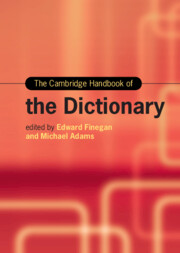Book contents
- The Cambridge Handbook of the Dictionary
- Cambridge Handbooks in Language and Linguistics
- The Cambridge Handbook of the Dictionary
- Copyright page
- Contents
- Figures
- Tables
- Contributors
- Acknowledgments
- Introduction
- Part I Types of Dictionaries
- Part II Dictionaries as Books
- Part III Dictionaries and Ideology
- Part IV Dictionaries and Domains of Use
- Chapter 20 Dictionary Audiences
- Chapter 21 Dictionaries and Intellectual History
- Chapter 22 Dictionaries and Social History
- Chapter 23 Linguistics and Philology in Dictionaries
- Chapter 24 Dictionaries as Literary Artifacts
- Chapter 25 Dictionaries and Editors
- Chapter 26 Lexicography and the Law
- Part V The Business of Dictionaries
- Part VI The Future of Dictionaries
- References: Dictionaries
- References: Secondary Works
- Index
Chapter 25 - Dictionaries and Editors
from Part IV - Dictionaries and Domains of Use
Published online by Cambridge University Press: 19 October 2024
- The Cambridge Handbook of the Dictionary
- Cambridge Handbooks in Language and Linguistics
- The Cambridge Handbook of the Dictionary
- Copyright page
- Contents
- Figures
- Tables
- Contributors
- Acknowledgments
- Introduction
- Part I Types of Dictionaries
- Part II Dictionaries as Books
- Part III Dictionaries and Ideology
- Part IV Dictionaries and Domains of Use
- Chapter 20 Dictionary Audiences
- Chapter 21 Dictionaries and Intellectual History
- Chapter 22 Dictionaries and Social History
- Chapter 23 Linguistics and Philology in Dictionaries
- Chapter 24 Dictionaries as Literary Artifacts
- Chapter 25 Dictionaries and Editors
- Chapter 26 Lexicography and the Law
- Part V The Business of Dictionaries
- Part VI The Future of Dictionaries
- References: Dictionaries
- References: Secondary Works
- Index
Summary
Copyeditors and proofreaders are some of the heaviest users of dictionaries, consulting them regularly in the course of their work, though little has been written on the influence of dictionaries on editors or of editors on dictionaries. Editors consult dictionaries on matters of spelling, capitalization, compounding, meaning, end-of-line hyphenation, and more. They may also disallow new forms or senses not found in a dictionary. Further, style manuals typically dictate not only which dictionary to use but how to use it, particularly on matters of spelling variants. Dictionaries thus become prescriptive tools in the hands of editors, despite lexicographers’ descriptive approach. There may also be something of a feedback loop between editors and lexicographers: because editors are gatekeepers of publishing, they have an outsized influence on what appears in print and thus what is recorded in dictionaries and therefore regarded as correct. Through dictionaries, copyeditors may therefore play an underappreciated and largely unexplored role in shaping standard English.
Keywords
- Type
- Chapter
- Information
- The Cambridge Handbook of the Dictionary , pp. 493 - 511Publisher: Cambridge University PressPrint publication year: 2024

